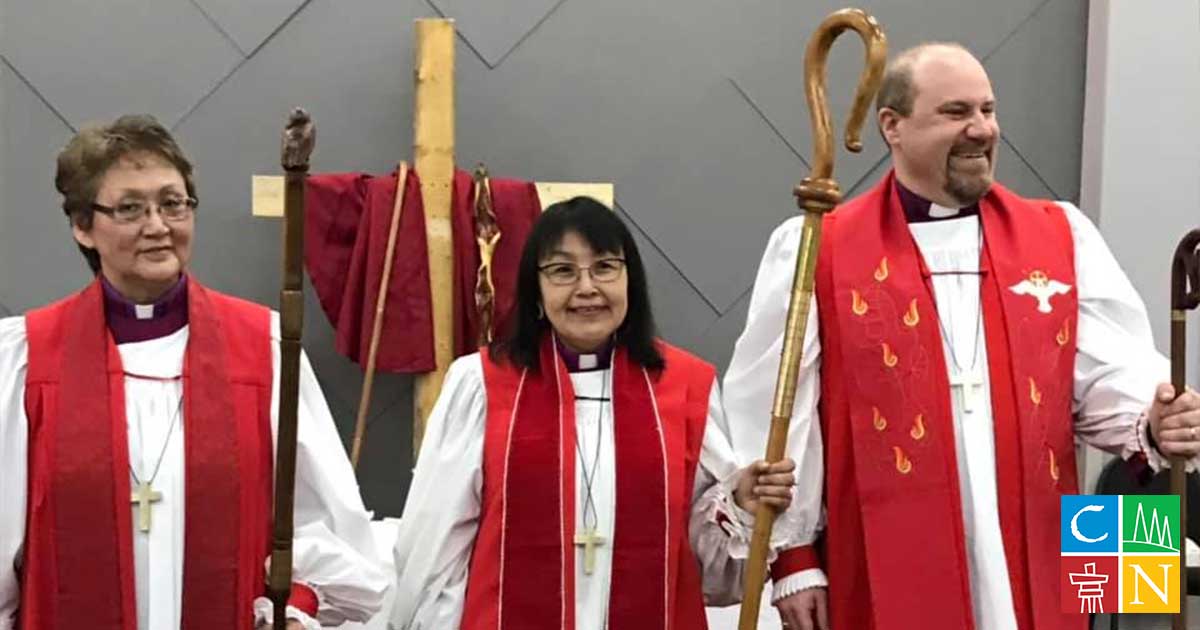By Matt Gardner
On Nov. 13, health authorities confirmed the first case of COVID-19 in Arviat, a predominantly Inuit hamlet in Nunavut with an estimated population of 2,850. The following months saw Arviat become by far Nunavut’s worst-hit community, with 339 confirmed cases—more than two-thirds of all cases in the territory as of April 30.
Soon after the appearance of COVID-19, the hamlet imposed tight lockdown measures to control the spread of virus. An Anglican bishop, the Rt. Rev. Lucy Netser, contacted the local radio committee to ask if she could bring her Christian message to the airwaves. The committee responded favourably, and other churches soon followed.
Today, Bishop Netser has a two-hour slot every Sunday on the local community radio station, Arviaqpaluk 96.5 FM. From 11 a.m. to 1 p.m., she offers morning worship, Scripture readings, and prayers and encouragement for the community. Other churches offer their own programs afterwards, with Arviat Alliance Church starting at 1 p.m., Glad Tidings Church at 3 p.m. and St. Therese Catholic Church at 5 p.m.
“In the Arctic, a lot of people go to church,” Netser says. “When something like a pandemic is happening, that’s when we really need to be there for each other and encourage each other and pray for each other.”
Bishop Netser primarily uses the Inuktitut version of The Book of Common Prayer to lead prayers on the radio, since there is no Inuktitut translation of The Book of Alternative Services. She also prays for the communities and offers listeners a brief period of silence to pray on their own for people they might be concerned about.
Hymns are a mainstay of the program, with Netser often inviting guests on the air to perform them.
“Sometimes I call them ahead of time [to see] if they can sing on the radio,” Netser says. “A lot of people are musical in this community. They sometimes sing over the phone, sometimes more than one person in a house.”
Most weeks, Netser delivers a sermon on her Sunday show. But sometimes she invites guests from within the community or out of town to deliver sermons, such as retired Anglican bishop Andrew Atagotaaluk. Guests will call at a certain time in order to speak on the radio.
Netser says Arviat residents responded positively to the on-air prayers, sermons and hymns.
“They really liked it,” she says. “I’d say we reach more people that way. Some people don’t really like going to the church, but at home, they can have a prayer at home with their family.”
She adds, “Sometimes, parents call me afterwards saying that they really enjoyed the radio show today, because ‘my children were listening with me and praying with me.’ Some little kids started knowing my voice, who I was, so that was kinda cute.”
Besides church programs on Sundays, Arviaqpaluk offers a range of other radio programs throughout the week, with each business or community organization given an equal two-hour slot. Mondays include cultural programs. Thursdays provide updates from the health centre. On Fridays listeners can call in to a show focusing on mental health. Content is in a mix of Inuktitut and English—the former being the predominant language in Arviat.
Station manager Laura Tassiuk says that community radio has been “very important” in bringing people together during the pandemic, helping residents “be cautious and be careful, and to keep everybody informed so we’ll all be on the same page.”
She also acknowledges the support that community programs can offer for people isolated during the pandemic. “I think it keeps everybody calm and sane,” Tassiuk says.
“Every day is different, I think,” she adds. “We’re managing. We’re surviving, one day at a time.”
In recent weeks, the situation has improved dramatically. Arviat’s fight against the coronavirus saw a major victory on April 20, when residents marked two weeks since the last person in the community came out of isolation. Many locals celebrated the end of the outbreak with a parade of vehicles in the streets.
Netser is unsure whether Arviaqpaluk radio will remain as active after the pandemic. But she hopes that residents gained encouragement and hope from listening during the peak of the outbreak—and a knowledge that even the hardest times will pass.
“There’ve been pandemics before and that has passed, and it’s going to be like that again,” Netser says. She compares the experience of the pandemic to stormy seas that eventually calm, or the aftermath of an earthquake.
“After the earthquake tremors, then there’s peace,” the bishop says. “It’s like that still …
Interested in keeping up-to-date on news, opinion, events and resources from the Anglican Church of Canada? Sign up for our email alerts .

